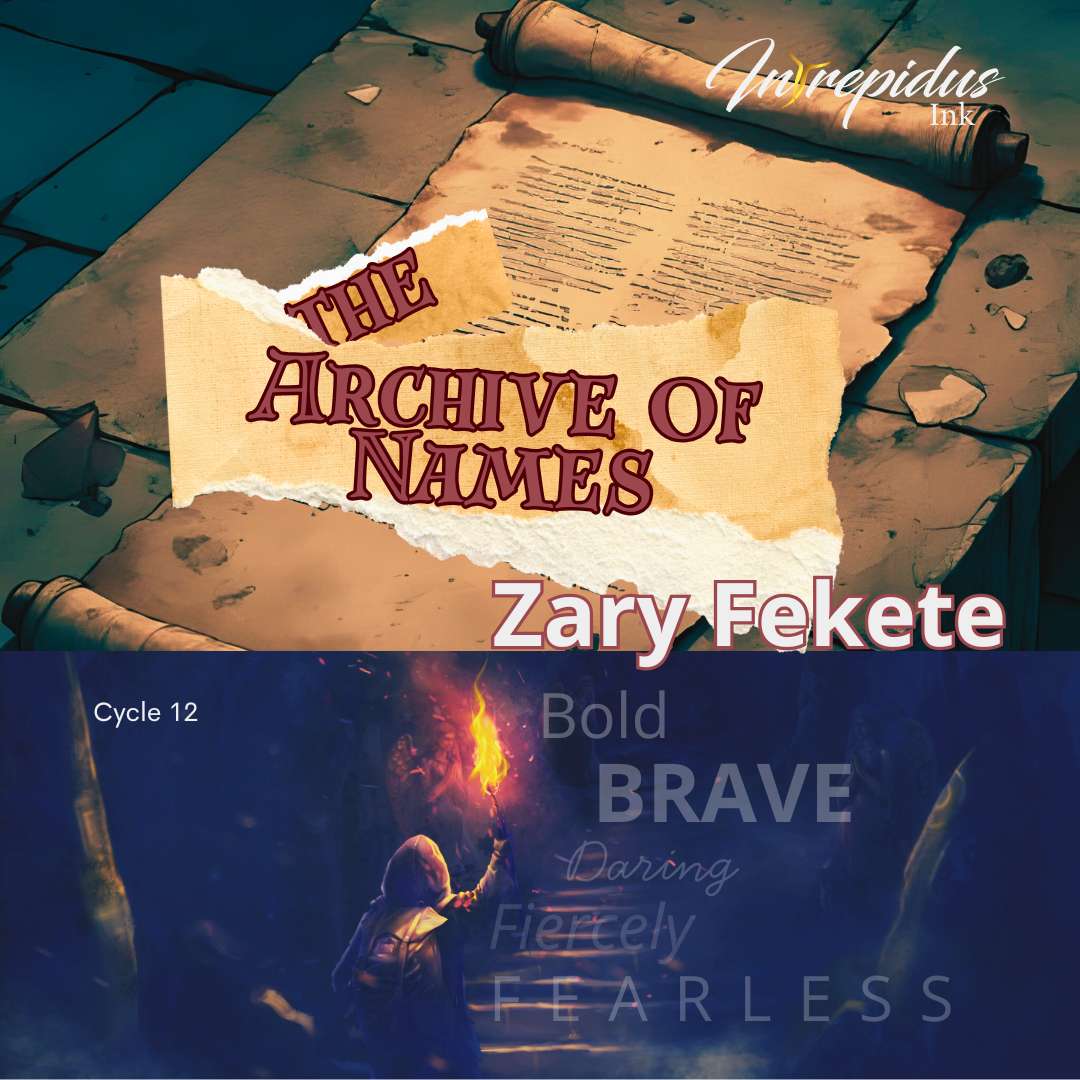

Speculative Fiction
The hall around me echoed; a smell of wax and wet stone drifted through the air. Incense swirled, its twisting, grey mist drifted toward the vaulted ceiling. Thousands of candles threw flickering light onto the ancient pillars. The gold-etched spines of ledgers stretched back into the dim recesses of the Archive’s hallways.
I stood to the side of the chamber, my quill and roll of parchment tucked beneath my arm. The first parents of the day shuffled forward, their faces bright, their eyes alternating between their child’s face and the presiding Archivist who stood before them. The child was wrapped in a white cloth with a single, scarlet thread stitched through it. They carried the babe as though the body might dissolve if they clutched it too tightly.
The Archivist picked up his quill. He asked for the child’s weight, date of birth, hour of first breath. The parents’ whispered answers echoed lightly in the air. The Archivist nodded, dipping his pen and opening Ledger 71. A silent moment passed as he wrote a name. Then, he looked up and spoke the name into the chamber, his voice firm and resolute.
Tears rolled down the parents’ cheeks. The mother pressed a kiss to the baby’s forehead…softly whispering the new name. The father looked up at the Archivist and then at the vaulted ceiling above, murmuring the name like a prayer, as though it had been carried to them out of eternity and was now their sacred treasure. The gathered crowd clapped softly, politely.
Another couple came forward. Another child was named.
Throughout the ceremony, I stood and watched. I was not there to assist but to witness. The elders told us apprentices that our time in the ledgers must be occasionally interrupted to bear witness to the ceremony. It was meant to ground us, to remind us what the work was for. To witness the moment when shadow and innocence were bound together. Humbly. Reverently.
I never doubted this. Until the day I was sent into the deep Archive.
My mentor was the one who gave the order. His hands were wrinkled, spotted with ink…his eyes cloudy and dim from decades of candlelight.
“There is a bundle of parchments in the deep vault,” he told me one evening. “Bring it to me. You will know it by the red cord that binds it.”
The deep Archive was below the Hall and known only to the Archivists and apprentices. It lay below the mildewed staircases and three locked gates. The final barrier was a sealed door that preserved the dry air within, for most of the records kept below contained fragments too fragile to handle daily.
I gripped a lantern and descended. The air drifting past me grew colder. My breath puffed out in clouds. The weight of centuries pressed down on the leaning rows of shelves I passed.
Once I reached the deep Archive, I found the bundle easily, resting on a lower shelf. I lifted it and was about to turn back when a single sheet of parchment drifted to the floor. I frowned and bent to pick it up.
The lantern light fell across the page. My breath caught in my chest.
The name was one I knew well: a baker’s son, a boy in my own class, cheerful and quick to laughter. But beside the name, in cramped writing, was another line: Executed. Year 143. Crime: sedition.
But…the boy wasn’t dead! I had seen him yesterday on my walk home.
My pulse hammered. I checked another line, then another. Some names were foreign to me. Others I recognized. An upstairs neighbor. A distant cousin. My first-grade teacher. Each name carried a shadow line: A crime. A date. And then the same sentence…Executed. Executed. Executed.
They were not parables or metaphors. They were records.
Ledgers of the condemned.
I returned to my mentor with the bundle, my face pale. He watched me set it down. My hands shook.
“You found it,” he said simply.
“You knew?”
“Of course.” He leaned back, his eyes steady on mine. “This was your test.”
“A test?”
He nodded. “If you had missed it, you would be sent elsewhere. To the markets, perhaps. To count grain, or keep tolls. A respectable life, but shallow. If you saw it, if you understood, then you are meant to remain here, in the Archive. To carry what must be carried. To keep the people safe from truths that would destroy them.”
My mouth went dry. “Then the names?”
“They belong to the condemned. Their sins are bound to us, so they cannot roam free. Each generation bears a portion. Each child walks in humility. This is how we keep pride from devouring us.”
“Then why the secrecy?” I asked in a trembling voice. “If the system is righteous, why hide it?”
His eyes narrowed. “Because most are weak. If they knew, some would glorify the condemned. They would call them martyrs. They would tear down the Archive. And without the Archive, we would be no better than beasts.”
A surge grew in my chest. Thoughts gathered.
But the words caught in my throat. My mentor knew me well. I could not speak.
Weeks passed. My work continued. I copied the fading script onto fresh vellum. I stood at ceremonies, quill case beneath my arm, watching names spoken aloud as though they were pure.
But the knowledge I carried inside me pressed like stones against my ribs.
Then my sister gave birth.
Her first child. She invited me to the naming ceremony. The family gathered in joy, crowding the Hall, whispering prayers of gratitude. My sister’s face shone with exhaustion and pride. Her husband held her hand. The baby stirred in the white cloth.
I stood again at the side of the chamber, my hands damp with sweat.
The presiding Archivist raised his quill. He asked the questions: weight, date, hour of birth. My sister whispered her answers.
The Archivist raised his hand over the child. An utter hush filled the hall. He spoke the child’s name. My sister wept. The Hall filled with polite applause, soft as rain on marble.
My breath caught. This was my moment.
I stepped forward from the shadows at the side of the chamber. My sandals struck the stone with a sound that seemed impossibly loud. Heads turned. The presiding Archivist froze, quill still dripping ink onto the open ledger.
From my robe, I drew a scrap of parchment: faded, brittle, stolen from the deep Archive. By then, I knew where to find the right piece. My hands shook, but my voice came clear, each word striking the air like a bell.
“This is my name,” I said, holding the parchment aloft. “Written here with its true history: Executed. Year 192. Crime: blasphemy. This is the label I was given at birth.”
Gasps rippled through the chamber. Parents pulled their children closer. My sister’s face blanched, her lips parting in disbelief.
Gathering more courage, I raised my voice louder. “This ceremony conveys no nobility. It applies a curse. It is a condemnation!”
The presiding Archivist slammed the ledger shut. “Silence,” he thundered. “You defile this hall with lies!”
But I did not stop. I turned to the swaddled child in my sister’s arms. My voice trembled now, but I forced it steady. “And the name just spoken over your son? This, too, I have seen in the records. Executed. Year 143. Crime: sedition. That is the gift we are told to celebrate. That is the blessing we are told to cheer.”
The applause had died. The Hall was a still pool waiting for a stone to fall. I threw it.
“Every name in the Archive is bound to the condemned. We wear the names of criminals. We are not bearing humility. We are carrying chains.”
The silence cracked.
A woman in the crowd clutched her daughter and cried out, “What of mine? Tell me what hers means!” Others pressed forward, desperate, frantic. “And my son’s?” “And my husband’s?” “What of me?”
The presiding Archivist raised his staff, pounding it against the stone. “Blasphemy! Deceit! This is forbidden knowledge!”
But the voices rose, drowning him out. Some wept. Some shouted in rage. Others stared at their children as though seeing them for the first time, as though the air itself had changed.
I stood trembling in the center of the storm, parchment in hand, my heart hammering. I had expected denial, punishment, silence. Instead, there was hunger–raw, desperate hunger for truth.
Then my sister stepped forward.
She cradled her son close, her face streaked with tears, her body shaking. For a moment, I feared she would turn from me, that she would side with the Archive and call me traitor. But she lifted her chin, her voice breaking but strong.
“My child will not bear chains,” she said. “He will not walk under the shadow of the executed.” She looked down at the baby in her arms, then back at the gathered families. “I will give him a name of my own choosing.”
And she spoke it over his head. Simple, unadorned, but filled with light. A name without record, without stain. Her husband whispered it after her, his hand trembling as it touched his son’s face.
For a single moment, there was silence as the new name hung in the air.
Then, like rings expanding in a still pond, parents turned to their children. Husbands turned to wives. And they spoke.
The presiding Archivist roared for silence, but already they were whispering new names. Secret names, hidden names, names they had once spoken in private, now given voice in public. A father clutched his daughter, speaking a name so tender it drew tears. A mother bent low to her son and whispered a new name into his ear.
The Hall became a chorus. At first scattered, uncertain. Then louder, stronger, until the Archivist’s staff struck the floor in vain. His orders vanished under the tide of voices.
I clutched the parchment to my chest. My sister’s eyes met mine, wide with both fear and defiance. And all around us, the air filled with names no ledger had ever contained.
The volumes still stood on the shelves, their bindings glinting in the candlelight.
But for the first time in centuries, they were ignored.
Author Bio

Zary Fekete grew up in Hungary. He has a debut novella (Words on the Page) out with DarkWinter Lit Press and a short story collection (To Accept the Things I Cannot Change: Writing My Way Out of Addiction) out with Creative Texts. He enjoys books, podcasts, and many many many films. Twitter and Instagram: @ZaryFekete Bluesky:zaryfekete.bsky.social.

